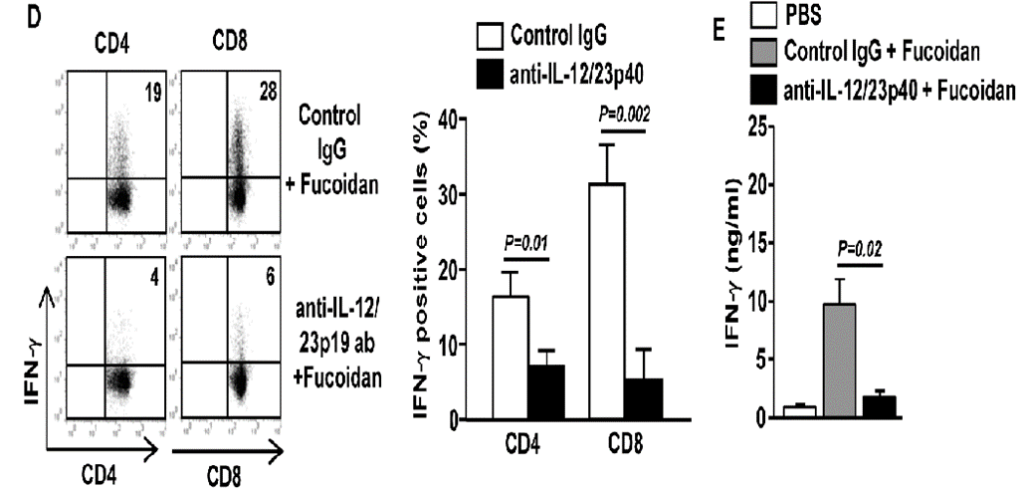In this blog, I would like to share about the effects of fucoidan on splenic dendritic cell (DC) function and the research “Fucoidan Can Function as an Adjuvant In Vivo to Enhance Dendritic Cell Maturation and Function and Promote Antigen-Specific T Cell Immune Responses” by Jun-O Jin et al. The study investigated its adjuvant effect in vivo. Fucoidan exhibits a range of immunomodulatory effects, including the promotion of antigen uptake and the enhancement of antiviral and antitumor effects. However, the effects of fucoidan in vivo, especially its adjuvant effects on anti-tumor immune responses in vivo, have not been fully investigated yet.
The study, as a result, set out to determine whether fucoidan could also induce the maturation of mouse DCs in vivo. They injected C57BL/6 mice intraperitoneally (i.p.) with 10 mg/kg fucoidan for 24 h. Fucoidan treatment significantly increased the expression of CD40, CD80, CD86, and MHC class II in the spleen. (See Figure 1A and B) 24 hours after injection of fucoidan These data indicate that the administration of fucoidan induces splenic cDC maturation in vivo.
The objective of this study was to investigate the influence of fucoidan on cytokine production. To achieve this, samples of serum and spleens were collected from C57BL/6 mice at the three-hour mark after the administration of fucoidan. These samples were then analyzed to determine the levels of pro-inflammatory cytokines. Fucoidan treatment induced upregulation of IL-6, IL-12p40, and TNF-α mRNA levels, but not IL-23p19 mRNA, in splenocytes. (See Figure. 1 A) Serum levels of IL-6, IL-12p70, and TNF-α were also dramatically increased in fucoidan-treated mice. (See Figure 1 B) To specifically measure cytokines produced by cDCs, rename CD11c+ cDCs were isolated from splenocytes 2 hours after fucoidan administration, and the cells were then incubated in a culture medium for an additional 4 hours. Fucoidan treatment induced a marked increase in IL-11 production. Purified CD11c+ cDCs from mice treated with fucoidan for 2 hours had dramatically higher IL-6, IL-12p40. Additionally, TNF-α mRNA levels than those from control mice. (See Figure. 1 D) Systemic administration of fucoidan induced upregulation of CD40, CD80, and CD86 expression and IL-6, IL-12, and TNF-α production in splenic cDCs.
Their subsequent analysis focused on determining whether the augmentation of Th1 and Tc1 responses by fucoidan is contingent upon IL-12, a significant activator of Th1 and Tc1 cells in different immune responses. The promoting effect of fucoidan administration on IFN-γ production in CD4 and D8 T cells was almost completely abolished by the neutralization of IL-12/23p40 (Fig. 2 D). The increase in serum IFN-γ levels induced by fucoidan was also completely suppressed by anti-IL-12/23p40 treatment. (See Figure. 2 E). Thus, Fucoidan promotes the generation of IFN-γ-producing Th1 and Tc1 cells in an IL-12-dependent manner. Fucoidan also promoted the generation of IFN-γ-producing Th1 and Tc1 cells in an IL-12-dependent manner.
In order to ascertain whether fucoidan possesses an adjuvant effect in vivo, the researchers proceeded to immunize mice with OVA and fucoidan. Subsequently, they assessed the production of specific antibodies and the T-cell responses directed against OVA. Mice immunized with OVA + fucoidan produced remarkably higher amounts of anti-OVA IgG1 and IgG2a than control mice immunized with OVA alone. Splenocytes were also harvested on day 35 and restimulated with OVA for 4 days in vitro before analysis of OVA-induced T cell responses. Splenocytes from mice immunized with OVA + fucoidan showed significantly greater cell proliferation and IFN-γ production than those from control mice immunized with OVA alone.
The results obtained from this study suggest that fucoidan has the ability to act as an adjuvant by stimulating Th-type immune responses. Next, they examined whether fucoidan promotes the generation of effector/memory T cells in OVA-immunized mice based on the surface expression of CD44. As shown in Figure 4E, fucoidan injection led to a marked increase in the proportions of CD44+ CD4 and CD8 T cells. These data suggest that fucoidan functions as an adjuvant to enhance antigen-specific T and B cell immune responses.
Fucoidan also enhanced OVA-induced upregulation of MHC class I and II on splenic cDCs and potently promoted the proliferation of OVA-specific CD4 and CD8 T cells. Finally, OVA immunization with fucoidan as an adjuvant protected mice from challenges with B16-OVA tumor cells.
The study provides evidence that fucoidan produced by Fucus vesiculosus is a novel adjuvant that can stimulate DC maturation, CTL activation, Th1 immune response, antigen-specific antibody production, and memory T cell generation. Based on the results obtained, it can be inferred that fucoidan exhibits adjuvant characteristics, stimulating Th1 immune responses and facilitating CTL (Cytotoxic T lymphocytes) activation. These findings propose its potential application in tumor vaccine development.



Source: https://doi.org/10.1371/journal.pone.0099396
